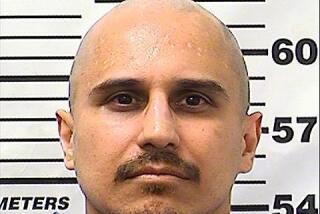In George Zimmerman trial, police investigators take stand
- Share via
Two police investigators outlined their interviews with George Zimmerman as the prosecution and defense in the murder case sparred over inconsistencies in the neighborhood watch volunteer’s statements about how he met and shot Trayvon Martin, an unarmed teenager.
Zimmerman, 29, is charged with second-degree murder in the shooting of Martin, 17, on Feb. 26, 2012, in a gated community in Sanford, Fla. Zimmerman has said he shot Martin in self-defense.
Zimmerman talked to police right after the shooting, then again after midnight at the police station. Later on Feb. 27, Zimmerman walked through the scene and gave a detailed narrative that police recorded on video. The six-person jury heard and saw oral and video statements and heard the written statements read aloud Monday, the start of the prosecution’s second week of presenting its case.
Lead investigator Christopher F. Serino and Doris Singleton, who conducted the first interview with Zimmerman after the shooting, took the stand. Serino said he was concerned with the inconsistencies among the different accounts.
At one point, Serino tells Zimmerman that his statements of being hit 25 to 30 times were “not quite consistent” with the level of his injuries from the confrontation with Martin.
Serino is also heard telling Zimmerman to expect officials to scrutinize the shooting carefully because of “the profiling aspect of the whole thing.” Martin was black; Zimmerman identifies as Latino.
Serino acknowledged that he discussed the racial aspects of the case with Zimmerman, asking him whether he would have acted the same way if Martin had been white. Zimmerman said he would have, Serino testified in response to questions from defense attorney Mark O’Mara.
“There were external concerns,” Serino said. “I needed to get that clarified.”
In cross-examination, O’Mara asked whether the officer thought Zimmerman’s inconsistencies might be those of a person who had just gone through a traumatic event. Serino agreed that Zimmerman had been open with police and that an investigator would expect some differences.
If Serino came across a person who gave an account “fact for fact, word for word, what would you think of the person’s veracity?” O’Mara asked.
“I would think he was completely honest or completely false,” Serino said.
In one recording, Zimmerman is heard describing how he saw Martin and told a police dispatcher: “These guys always get away ... the people committing the burglaries.” The prosecution has portrayed Zimmerman as having been increasingly frustrated by crime in the housing community.
Zimmerman told Singleton that he lost track of Martin, so he got out of his vehicle to look for a street name that he could pass on to authorities. When the dispatcher said that Zimmerman didn’t need to follow Martin, Zimmerman said he started to head back to his vehicle.
At that point, Zimmerman said in the recording, Martin jumped out, apparently from some bushes and attacked him. Zimmerman said he fell to the ground and yelled for help as Martin began hitting his head against the sidewalk.
“I said, ‘Help me. Help me. He’s killing me,’” Zimmerman said. He told the police investigator that Martin replied, “You’re going to die tonight.”
He and Martin struggled, Zimmerman said, and as they fought his gun became visible. Zimmerman said he shot Martin because he thought Martin was reaching for the weapon.
“You got me,” the teenager said, Zimmerman told the officer.
Singleton said Zimmerman seemed surprised when she told him Martin was dead. “He’s dead?” Singleton recounted him asking.
O’Mara also asked Singleton whether a traumatic event, such as a shooting, could have an effect on a person’s ability to recount the events. She agreed it could.
Singleton also said she had no evidence that Zimmerman had any ill will, anger or hatred for the teen — terms that could be crucial for the prosecution to get a second-degree murder conviction.
Earlier, an FBI audio expert who played a key role helping the defense during pretrial hearings testified as a prosecution witness that there was no way to definitively identify whose voice is heard screaming on an emergency call.
Hirotaka Nakasone was called to establish the effectiveness of voice identification by someone who is familiar with the sounds being examined.
Martin’s mother, Sybrina Fulton, is expected to testify that the screams on the tape were her son’s.
More to Read
Sign up for Essential California
The most important California stories and recommendations in your inbox every morning.
You may occasionally receive promotional content from the Los Angeles Times.











